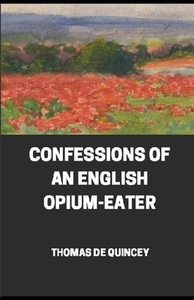You need to sign in or sign up before continuing.
Take a photo of a barcode or cover
reflective
slow-paced
racist stoner loses his marbles. entertaining at times
"I seemed every night to descend, not metaphorically, but literally to descend, into chasms and sunless abysses, depths below depths, from which it seemed hopeless that I could ever re-ascend."
Going into this I expected delusional ravings from a madman high out of his mind and instead received profound and incredibly lyrical meditations on growth, grief, and solitude. While there are some parts that seem dragged-out and unnecessary, Quincey himself defines his style of writing as journal-esque, personal to the point that he rarely omits anything that drifts through his head (he's got a very interesting head). I think being aware of this makes it easier to appreciate the core messages of the text.
Predictably, Quincey talks about the effects of opium. As laid out by him, opium is temporary happiness tempting the consumer into "cloudless serenity" which functions as a mere distraction of the real pain suffered on Earth- the self-possession he claims is given to him by the drug transforms into a plague on the mind, an "apocalypse of the world within". It exposes parts of the mind which the sober body sought to suppress and distorts them into nightmares.
Quincey uses opium as a means to "mitigate pain", to escape misery. However, the drug increases pain by casting its user from short-lasting bliss to harsh reality: it establishes two extremes, punishing the consumer into either growth or death. To cease one's addiction or to succumb to its fatal temptation.
Growth is another key word in Confessions. Solitude is described by Quincey as a disease which one grows accustomed to. By wallowing in misery one accepts the punishment which signals one's guilt and thereby exempts one from change. It is the act of confessing one's sins without ever stopping to commit them. Contradictory enough, growth is punishment when perceived as the removal of destructive habits one clings so desperately to. In other words: bad things happen so people may grow from them. It is not punishment but the possibility for change. The ability to endure instead of succumbing to misery. As Quincey put it, "without a basis of the dreadful, there is no perfect rapture."
Going into this I expected delusional ravings from a madman high out of his mind and instead received profound and incredibly lyrical meditations on growth, grief, and solitude. While there are some parts that seem dragged-out and unnecessary, Quincey himself defines his style of writing as journal-esque, personal to the point that he rarely omits anything that drifts through his head (he's got a very interesting head). I think being aware of this makes it easier to appreciate the core messages of the text.
Predictably, Quincey talks about the effects of opium. As laid out by him, opium is temporary happiness tempting the consumer into "cloudless serenity" which functions as a mere distraction of the real pain suffered on Earth- the self-possession he claims is given to him by the drug transforms into a plague on the mind, an "apocalypse of the world within". It exposes parts of the mind which the sober body sought to suppress and distorts them into nightmares.
Quincey uses opium as a means to "mitigate pain", to escape misery. However, the drug increases pain by casting its user from short-lasting bliss to harsh reality: it establishes two extremes, punishing the consumer into either growth or death. To cease one's addiction or to succumb to its fatal temptation.
Growth is another key word in Confessions. Solitude is described by Quincey as a disease which one grows accustomed to. By wallowing in misery one accepts the punishment which signals one's guilt and thereby exempts one from change. It is the act of confessing one's sins without ever stopping to commit them. Contradictory enough, growth is punishment when perceived as the removal of destructive habits one clings so desperately to. In other words: bad things happen so people may grow from them. It is not punishment but the possibility for change. The ability to endure instead of succumbing to misery. As Quincey put it, "without a basis of the dreadful, there is no perfect rapture."
We hear it reported of Dryden, and of Fuseli in modern times, that they thought proper to eat raw meat for the sake of obtaining splendid dreams: how much better for such a purpose to have eaten opium, which yet I do not remember that any poet is recorded to have done, except the dramatist Shadwell: and in ancient days, Homer. (104)
Obsequious writing
Thomas de Quincey is using the "Homeric Epithet" when he references Agamemnon by the phrase "king of men" (72); the epithet continues to serves its function as a record of the indelible quality of a character. The modern man, however, has since tired of Homeric 'dactylic hexameter,' and no longer finds the Poet to be the great-entertainer-of-men. He is also perhaps more likely to recall the "Homeric Epithet" in its more televised form: "D'oh!"
Perhaps it's more than mere coincidence that we find in the biographic introduction, to mild amusement, that de Quincey is also married to a Marge (Margaret) Simpson, and we might therefore suggest that the similarity between these characters runs more than skin deep. Because not since the modern 'infotainment' novel have we seen such an obsequious desire to be liked, and therefore to conform in compleat agreement with the prejudice of the reader. (The (apocryphal?) quotation: "A quarter of all human suffering is toothache," is not to be found here, and perhaps lies in the less authoritative "expanded" text, rumoured, by that same introduction, to have been written at the later date at which de Quincey was, pejoratively, paid by the word, but at least may used that space to spin aphorisms.)
DNF at 78%.
It could be the LibriVox narrator. He places the emphasis at the beginning of a lot of words, each time pitching his voice upwards, making himself sound 'fancy'. I had to speed the narration to 1.8 + lower the pitch, but the narration was still such that I had difficulty retaining what he was saying unless I hyper-focused entirely on the text being said, which I usually don't have to do with audiobooks. I read that some people couldn't bear his narration as well, but others enjoyed it. There were comments about it getting better later on, and yes - the narration gets better, but it's still, in my opinion, unenjoyable.
So, clearly, because my listening experience was such that at best I was not annoyed, I did not retain much information. However, even at moments, when I was focusing, the book didn't tell anything that was interesting to me. The book's narrator (not the voice actor) was going on and on and on and I was not invested in his life at all.
It could be the LibriVox narrator. He places the emphasis at the beginning of a lot of words, each time pitching his voice upwards, making himself sound 'fancy'. I had to speed the narration to 1.8 + lower the pitch, but the narration was still such that I had difficulty retaining what he was saying unless I hyper-focused entirely on the text being said, which I usually don't have to do with audiobooks. I read that some people couldn't bear his narration as well, but others enjoyed it. There were comments about it getting better later on, and yes - the narration gets better, but it's still, in my opinion, unenjoyable.
So, clearly, because my listening experience was such that at best I was not annoyed, I did not retain much information. However, even at moments, when I was focusing, the book didn't tell anything that was interesting to me. The book's narrator (not the voice actor) was going on and on and on and I was not invested in his life at all.
An enjoyable read at times. The sections on the uses and pleasures of opium proved to be interesting but much of the essay contents most consisted of long tangents. Worth a read, not a re-read.
I found this book extremely funny. Not because he was trying to be funny, but because his worldview and way of existing lend themselves to humor. He is the quintessential starving artist (with a small fortune left in his name). The Orientalism in this though is, uh, not great and very of its time. But it also has some interesting insight into addiction and class struggle.
informative
reflective
slow-paced
I liked this book because it fits into my 'History of Medicine' obsession. It has beautiful language but is quite wordy. The description of the time and the locations in the story were fun to learn about, but the fact that drug addicts have beg around forever is sad. It was just a free, easy, period piece book.



